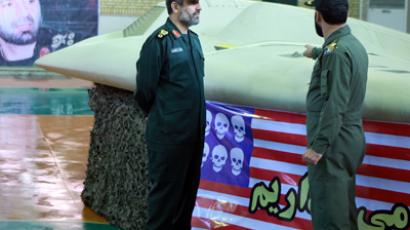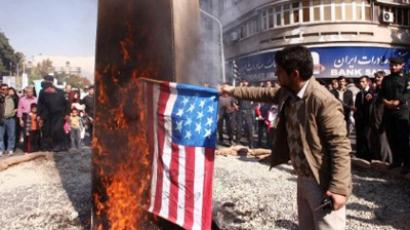‘US not ready for all-out conflict with Iran’
In the wake of Iran and the US threatening each other with navy might in the Persian Gulf, investigative writer Edwin Black says full military conflict would cripple the oil-dependent US – as well as the rest of the world.
After the International Atomic Energy Agency published a report on the Iranian nuclear program in November, Washington came up with fresh proposals to impose an embargo on Iranian oil. Iran responded with threats to block the Strait of Hormuz, the gateway for the Gulf countries’ crude exports to the rest of the world. With the two countries now showing off their naval capacities on either side of the strait, investigative writer Edwin Black tells RT that in embargos and sanctions Washington is seeking an alternative to a military strike. America is indeed concerned that Iran may be on the fast track of developing nuclear weapons. But, Black says, the US government is unprepared for this conflict as this would mean Gulf oil supplies would be choked off. “They do not have a plan for an oil interruption. There is a 57-day supply of unrefined oil that can be stretched to about a hundred days,” he told RT.Iran would not limit itself to merely blocking the Strait of Hormuz, remarks Black. In the event of an all-out conflict, Tehran could target Saudi Arabia’s oil facilities, such as the desulphurization plant at Ab Tak, which processes 70 per cent of Saudi oil, and the Ras Tanura terminal, a major oil port and oil operations center for Saudi Aramco, the world’s largest oil company. “If that is done, the world will be crippled,” he pointed out.Saudi Arabia, which has declared it will increase oil exports if Iran shuts the Strait of Hormuz, would not fill in the black hole of the world’s oil demands, observes Edwin Black. The main oil transport routes include the same strait, which would cease to be available. Other transport options do not have enough capacity. “There is a backdoor pipeline in Yanbo which has a capacity of about 1-5 million barrels per day, but this cannot make up for the 70 million barrels a day. And the Yanbo pipeline can be bombed as easily as Ras Tanura,” says Black.“The outlook is indeed grim,” he concludes. Most of the world is petrol addicted with maybe Brazil only enjoying the option of using alternative sources of energy. But with the US determination not to let Iran have nuclear weapons, some kind of military conflict looks inevitable.
'Iran and US playing lose-lose game'
Shirin Shafaie, from the School of Oriental and African Studies and Campaign against Sanctions and Military Intervention in Iran, says the crisis around Iran’s nuclear program requires an urgent diplomatic solution of mutual concessions. “This is a lose-lose situation,” Shafaie told RT. “Everybody is going to lose in that – except some military industrial complexes in the West. But if there is a diplomatic solution, we have a very good nuclear deal between Iran, Turkey and Brazil, which could be revived. On this deal, Iran could have most of its uranium, which is required for fuel rods, enriched abroad. President Obama supported the deal in his letter to the leaders of Brazil and Turkey in 2010.”














